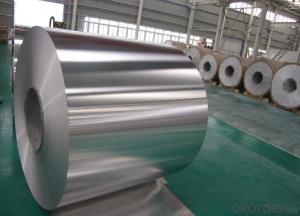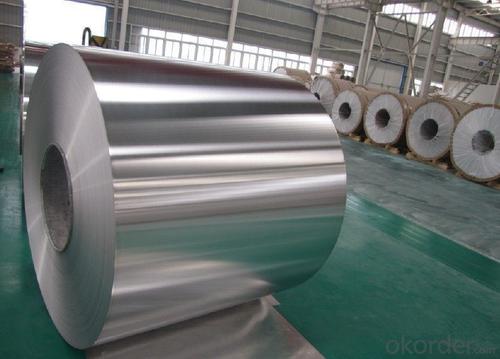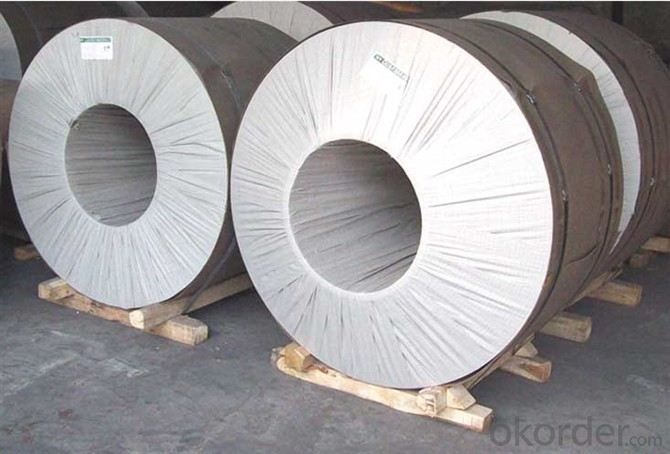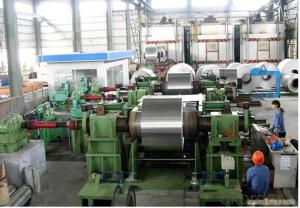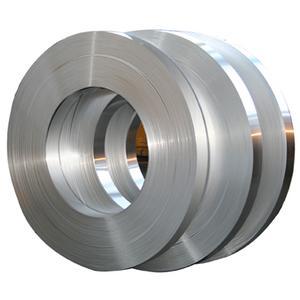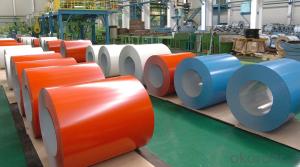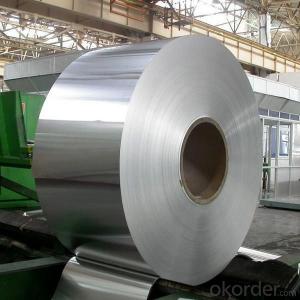High Quality 1070 Alloy Coil Aluminum
- Loading Port:
- Shanghai
- Payment Terms:
- TT OR LC
- Min Order Qty:
- 5 m.t.
- Supply Capability:
- 10000 m.t./month
OKorder Service Pledge
OKorder Financial Service
You Might Also Like
Specification
1. Specification of 1070 Alloy Aluminum Coil with High Quality
Material | Alloy Aluminum 6063,6061,6005 or customer nominated |
Temper | T3, T4, T5, T6 |
Surface | Anodize, electrophoresis, powder coating, PVDF coating, wood grain painting, matted, etc. |
Colour | Any colour based on Standard Germany RAL Mark |
Length | Coating 6.5 meters, Anodizing 6.5 meters, Mill finish 5 meters |
Press Machine | 500-4000 tons all together 64 press lines. |
Fabrication | 1. Windows and doors; 2. Drilling; 3. Bending; 4. Cutting; 5. etc. |
Certificate | ISO 9001 |
Moulding | 1. Using our moulds, no fee; |
2. Using customer drawing, opening mould, usually about 10~50 tons then the moulding can be refunded. | |
3. Mould cost is negotiable base on the order quantity | |
Capability | Annual output 100,000 tons |
2. Application of 1070 Alloy Aluminum Coil with High Quality
(1).Interior: wall cladding, ceilings, bathrooms, kitchens and balconies, shutters, doors...
(2).Exterior: wall cladding, facades, roofing, canopies, tunnels,column covers , renovations...
(3).Advertisement: display platforms, signboards, fascia, shop fronts...
3. Feature of 1070 Alloy Aluminum Coil with High Quality
*Such coil is specially designed to replace aluminum ingot, due to the high export tax of aluminum ingot, the coil has better price than ingot.
*This type of coil can fit customer's remelting furnace just like ingot, no need to make any change to the production line that was previously used for ingot. The standard coil size and weight is very suitable for the feed gate of furnace.
*This type of coil causes less material wastage than ingot when remelted.
*Our coil is made directly from ore, no need to go though the ingot making process, quality is much better than other suppliers who use ingot scrap to make coil.
Be free from Oil Stain, Dent, Inclusion, Scratches, Stain, Oxide Dicoloration, Breaks, Corrosion, Roll Marks, Dirt Streaks and other defect which will interfere with use
4. Certificate:
SGS and ROHS(if client request, paid by client), MTC(plant provided), Certificate of Origin(FORM A, FORM E, CO), Bureau Veritas and SGS (if client request, paid by client), CIQS certificate
5. Image of 1070 Alloy Aluminum Coil with High Quality
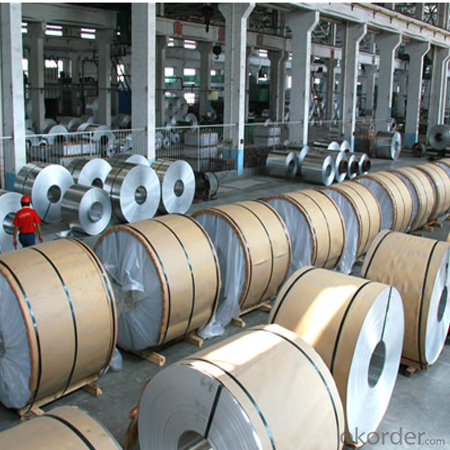
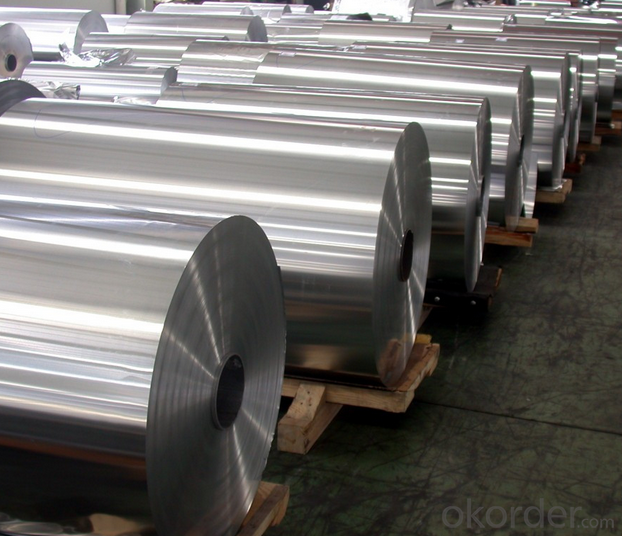
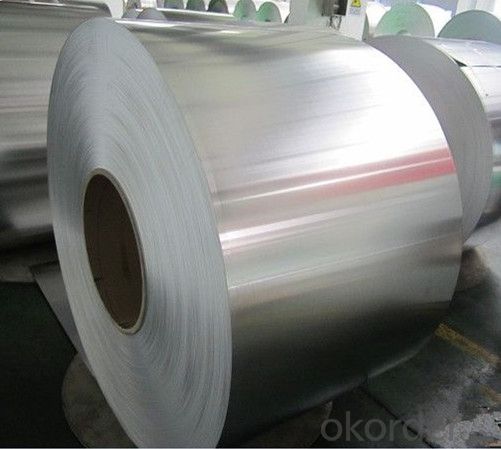
6. Package and shipping of 1070 Alloy Aluminum Coil with High Quality
eye to wall
eye to the wall
with wood pallet (wooded case also available)
7. FAQ
1) What is the delivery time?
Dpends on actual order, around 20 to 35 days
2)What is the QC system:
We have QC staff of 20 persons and advanced equipment, each production is with MTC traced from Aluminum ingot lot.
3) What market do you mainly sell to?
Australia, America, Asia, Middle East, Western Europe, Africa etc
- Q: Is aluminum veneer the same as color coated aluminum coil?
- Aluminum veneer is processed aluminum sheet, while color coated aluminum coil is raw material with color which can be called aluminum veneer after process.
- Q: What are the proper storage methods to maintain the quality of aluminum coil for future use?
- <p>To store aluminum coil for future use, ensure it is kept in a cool, dry place away from direct sunlight and moisture. Stack the coils on flat, level surfaces with appropriate padding to prevent damage. Avoid stacking with other metals to prevent galvanic corrosion. Use clean, dry hands or gloves when handling to prevent oil and dirt from contaminating the surface. Store in a controlled environment with a relative humidity below 65% and a temperature between 32掳F to 90掳F (0掳C to 32掳C). Regularly inspect the coils for any signs of corrosion or damage.</p>
- Q: Can aluminum coils be used for heat recovery systems?
- Indeed, heat recovery systems can utilize aluminum coils. Due to its exceptional heat conductivity, aluminum stands as an optimal option for heat transfer. In heat exchangers and heat recovery systems, aluminum coils frequently play a pivotal role in effectively transferring heat between different mediums. These coils are specifically engineered to maximize surface area, thereby enabling enhanced heat transfer. Furthermore, the lightweight and corrosion-resistant nature of aluminum renders it both durable and well-suited for a diverse range of applications within heat recovery systems.
- Q: Can aluminum coils be used for architectural facades?
- Yes, aluminum coils can be used for architectural facades. Aluminum is a popular choice for architectural facades due to its lightweight nature, durability, and versatility. Aluminum coils can be easily formed into various shapes and sizes to create innovative and visually appealing facades. The material is resistant to corrosion, making it suitable for outdoor applications. Additionally, aluminum can be easily coated or finished to enhance its aesthetic appeal and protect it from environmental elements. Overall, aluminum coils offer a cost-effective and sustainable solution for architectural facades.
- Q: Can aluminum coils be used in the manufacturing of beverage cans?
- Yes, aluminum coils can be used in the manufacturing of beverage cans. Aluminum is a commonly used material for manufacturing beverage cans due to its various advantages. Aluminum coils are typically rolled into thin sheets, which are then cut, formed, and coated to create the final can shape. These coils provide a lightweight, durable, and corrosion-resistant material that is suitable for storing and preserving beverages. Additionally, aluminum is a highly recyclable material, making it an environmentally friendly choice for beverage can production.
- Q: Are aluminum coils suitable for air conditioning systems?
- Yes, aluminum coils are suitable for air conditioning systems. Aluminum coils are commonly used in air conditioning systems due to their many advantages. Firstly, aluminum is a lightweight material, making it easier to handle and transport during installation. This also reduces the overall weight of the unit, making it more energy-efficient. Furthermore, aluminum coils have excellent heat transfer properties, allowing for efficient cooling of the air. They provide enhanced thermal conductivity, which helps in transferring heat quickly and effectively. This results in better cooling performance and improved energy efficiency, reducing electricity consumption and saving costs in the long run. Aluminum coils also offer superior corrosion resistance compared to other materials like copper. This is important in air conditioning systems, as they are exposed to moisture and humidity. Aluminum coils can withstand these conditions without corroding or deteriorating, ensuring longer lifespan and reliable performance. Another advantage of aluminum coils is their affordability. Aluminum is a cost-effective material, making it a popular choice for air conditioning manufacturers. This affordability can translate to lower costs for consumers, making air conditioning systems more accessible and affordable. In conclusion, aluminum coils are suitable for air conditioning systems due to their lightweight, excellent heat transfer properties, corrosion resistance, and affordability. They provide efficient cooling, durability, and cost-effectiveness, making them a preferred choice for air conditioning units.
- Q: How are aluminum coils manufactured?
- Aluminum coils are manufactured through a process known as aluminum coil rolling. This process involves several steps that transform aluminum ingots into coils of various sizes and thicknesses. The first step in manufacturing aluminum coils is aluminum smelting, where raw aluminum ore is extracted and refined into aluminum ingots. These ingots are then heated in a furnace to a specific temperature, where they become malleable and ready for the rolling process. The second step is hot rolling, where the heated aluminum ingots are passed through a series of rolling mills. These mills apply pressure to the ingots, gradually reducing their thickness and increasing their length. The aluminum ingots are rolled back and forth between multiple rollers to achieve the desired thickness and shape. This process also helps to improve the mechanical properties and surface finish of the aluminum. After hot rolling, the aluminum coils undergo a process called cold rolling. In this step, the coils are further reduced in thickness using a series of cold rolling mills. Cold rolling improves the dimensional accuracy, surface finish, and mechanical properties of the aluminum. It also helps to enhance the strength and hardness of the material. Once the desired thickness is achieved, the aluminum coils may undergo additional processes such as annealing or tempering. Annealing involves heating the coils and then slowly cooling them to relieve internal stresses and improve their ductility. Tempering, on the other hand, involves reheating the coils to a specific temperature and then rapidly cooling them to enhance their strength and hardness. After these processes, the aluminum coils are usually inspected for quality control purposes. They are checked for any defects, such as surface imperfections or thickness variations, and any necessary corrections are made. Finally, the aluminum coils are typically cut into smaller sizes and packaged for distribution to various industries that use them for different applications, such as in the manufacturing of automobiles, appliances, construction materials, and packaging. In conclusion, the manufacturing of aluminum coils involves processes such as smelting, hot rolling, cold rolling, annealing, tempering, and quality control checks. These steps ensure that the aluminum coils meet the required specifications in terms of thickness, strength, and surface finish.
- Q: 1) From What does aluminium derive its name?2)From which ore is aluminium extracted?3)Which country produces more aluminium than any other?4)An American and French scientist both patented the current process used to produce aluminium, what were there names?5)Who is credited with having been first to produce metallic aluminium?
- 1) From What does aluminium derive its name? Ancient Greeks and Romans used aluminium salts as dyeing mordants and as astringents for dressing wounds; alum is still used as a styptic. In 1761 Guyton de Morveau suggested calling the base alum alumine. In 1808, Humphry Davy identified the existence of a metal base of alum, which he at first termed alumium and later aluminum . The earliest citation given in the Oxford English Dictionary for any word used as a name for this element is alumium, which British chemist and inventor Humphry Davy employed in 1808 for the metal he was trying to isolate electrolytically from the mineral alumina. 2)From which ore is aluminium extracted? Bauxite 3)Which country produces more aluminium than any other? China 4)An American and French scientist both patented the current process used to produce aluminium, what were there names? Hall and Héroult 5)Who is credited with having been first to produce metallic aluminium? Friedrich W?hler
- Q: Can aluminum coils be used in the production of automotive parts?
- Indeed, automotive parts can be produced using aluminum coils. As a lightweight and highly malleable metal, aluminum is an excellent choice for manufacturing various components in the automotive industry. Body panels, hoods, fenders, doors, and even engine parts can all be fabricated using aluminum coils. The utilization of aluminum in this sector presents several benefits, such as enhanced fuel efficiency, superior performance, and reduced vehicle weight. Furthermore, aluminum coils are easily manipulable and can be shaped into intricate forms, allowing for greater design adaptability in the manufacturing of automotive parts. In conclusion, the use of aluminum coils has become increasingly popular in recent years and is now a common practice in the production of automotive components.
- Q: What benefits can utilizing aluminum coil bring to the construction industry?
- <p>Aluminum coil offers several advantages in construction, including its lightweight nature which reduces structural load and facilitates easier handling and installation. It is highly resistant to corrosion, ensuring longevity and low maintenance costs. The material is also known for its excellent thermal conductivity, making it suitable for energy-efficient applications. Additionally, aluminum coil is recyclable, contributing to sustainability and reducing environmental impact. Its versatility allows for various applications, from roofing and siding to structural components, enhancing aesthetic appeal and functionality.</p>
Send your message to us
High Quality 1070 Alloy Coil Aluminum
- Loading Port:
- Shanghai
- Payment Terms:
- TT OR LC
- Min Order Qty:
- 5 m.t.
- Supply Capability:
- 10000 m.t./month
OKorder Service Pledge
OKorder Financial Service
Similar products
Hot products
Hot Searches
Related keywords
